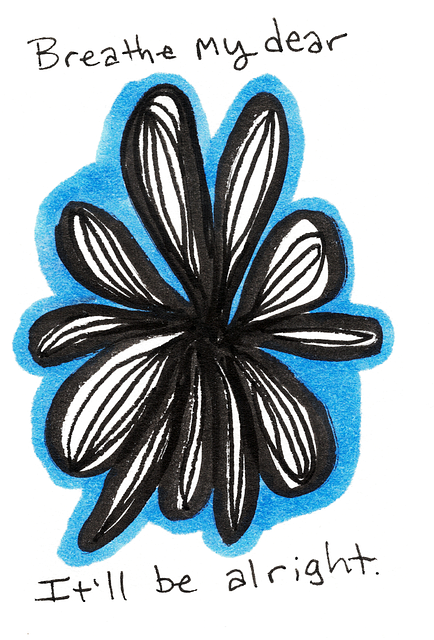Colorado Springs has established itself as a leading destination for individuals seeking Colorado Springs Panic Disorder and Anxiety Attacks Therapy. Its Crisis Intervention Teams (CITS) provide essential immediate assistance, enhance coping skills development, and improve risk management for healthcare providers. Using evidence-based practices and trauma-informed care, these teams create supportive environments that lead to better patient outcomes. The city's comprehensive services cater to both short-term panic attack support and long-term coping strategy development, empowering individuals for improved quality of life. Effectively trained CITs combat mental illness and anxiety disorders through understanding mental health conditions, active listening, and promoting positive thinking, ultimately facilitating access to holistic Colorado Springs Panic Disorder and Anxiety Attacks Therapy.
In today’s fast-paced world, effective crisis intervention teams (CITs) play a vital role in managing mental health crises. This article explores the critical work of CITs, with a specific focus on Colorado Springs, known for its thriving mental health support ecosystem. We delve into the essential components of crisis intervention training programs and highlight real-world success stories from local therapy sessions, showcasing how these initiatives are transforming lives, especially those dealing with panic disorder and anxiety attacks in Colorado Springs.
- Understanding Crisis Intervention Teams: Their Role and Impact
- Colorado Springs: A Hub for Panic Disorder and Anxiety Attack Support
- Essential Components of Effective Crisis Intervention Training Programs
- Real-World Applications: Success Stories from Colorado Springs Therapy Sessions
Understanding Crisis Intervention Teams: Their Role and Impact

Crisis Intervention Teams (CITS) play a vital role in supporting individuals facing severe mental health crises, such as panic disorder and anxiety attacks. These specialized teams, often composed of trained professionals including therapists, psychologists, and social workers, provide immediate assistance to those experiencing emotional distress or psychotic episodes. By quickly responding to 911 calls or emergency situations, CITS offer a crucial safety net, helping de-escalate high-risk scenarios and avert potential harm.
The impact of CITs extends beyond acute crisis management. Through their interventions, these teams foster coping skills development, enhance risk management planning for mental health professionals, and promote burnout prevention strategies for healthcare providers. By integrating evidence-based practices and trauma-informed care, Colorado Springs panic disorder and anxiety attacks therapy through CITs can lead to improved outcomes and a more supportive environment for both patients and caregivers.
Colorado Springs: A Hub for Panic Disorder and Anxiety Attack Support

Colorado Springs has emerged as a prominent destination for individuals seeking support and treatment for panic disorder and anxiety attacks. This vibrant city offers a range of specialized therapy options, making it a hub for mental health care in the region. The high prevalence of these conditions has driven the development of numerous crisis intervention team training programs, ensuring that professionals are equipped to handle such situations effectively.
The city’s focus on mental illness stigma reduction efforts has created an inclusive environment where individuals can openly discuss and seek help for their struggles. Moreover, Colorado Springs encourages positive thinking and resilience through various community initiatives, contributing to a holistic approach to mental health support. These comprehensive services cater not only to the immediate needs of those experiencing panic attacks but also aim to empower individuals with long-term coping strategies, fostering a sense of empowerment and improved quality of life.
Essential Components of Effective Crisis Intervention Training Programs

Effective crisis intervention training programs are meticulously crafted to equip individuals with the skills needed to handle critical situations, particularly those involving mental illness and anxiety-related disorders, such as panic attacks in Colorado Springs. These programs are designed to be comprehensive, focusing on several essential components. Firstly, they emphasize the importance of understanding the nuances of various mental health conditions, including depression, PTSD, and anxiety disorders. This knowledge enables trainees to recognize signs and symptoms, thereby facilitating timely interventions.
Secondly, these training programs prioritize developing active listening skills. Trainees are taught to pay close attention to clients’ verbal and non-verbal cues without judgment. Such techniques foster open communication, encouraging individuals in crisis to share their experiences and emotions freely. Additionally, positive thinking and stigma reduction efforts play a significant role, promoting understanding and empathy towards those suffering from mental illness. This holistic approach ensures that participants not only gain practical skills but also develop a more compassionate mindset, ultimately contributing to effective anxiety relief and better support for individuals facing panic disorders.
Real-World Applications: Success Stories from Colorado Springs Therapy Sessions

In real-world settings, Crisis Intervention Team (CIT) training programs have proven to be transformative in Colorado Springs, particularly when addressing panic disorder and anxiety attacks. These comprehensive programs equip citizens with the skills to recognize and respond effectively during mental health crises. By participating in role-play scenarios mimicking various emotional distress situations, including anxiety episodes, CIT team members gain practical experience in providing immediate support.
The success stories from Colorado Springs therapy sessions highlight how these training initiatives contribute to improved emotional well-being promotion techniques. Through collaborative efforts between community members, law enforcement, and mental health professionals, the program has led to better-equipped responders who can de-escalate situations, offer appropriate resources, and facilitate access to long-term Mental Health Education Programs Design. Furthermore, Social Skills Training components ensure that team members learn to interact sensitively with individuals experiencing anxiety disorders, fostering a supportive environment that promotes healing and recovery.
Crisis intervention team training programs play a pivotal role in equipping individuals to handle mental health crises effectively. As evidenced by success stories from Colorado Springs therapy sessions, these programs are instrumental in supporting those suffering from panic disorder and anxiety attacks. By focusing on key components such as empathy, de-escalation techniques, and communication skills, crisis intervention teams can make a tangible difference in the lives of individuals facing acute mental health challenges. For anyone interested in Colorado Springs panic disorder and anxiety attacks therapy or similar support, exploring these training programs is a crucial step towards building resilient communities.













